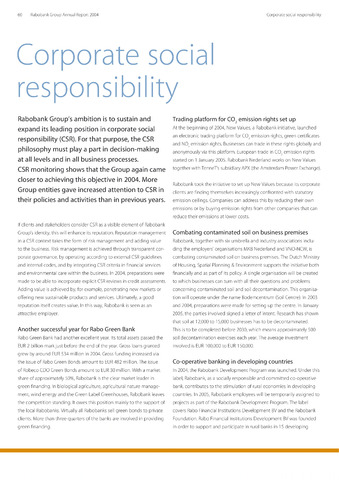Corporate social
responsibility
Rabobank Group's ambition is to sustain and
expand its leading position in corporate social
responsibility (CSR). For that purpose, the CSR
philosophy must play a part in decision-making
at all levels and in all business processes.
CSR monitoring shows that the Group again came
closer to achieving this objective in 2004. More
Group entities gave increased attention to CSR in
their policies and activities than in previous years.
Another successful year for Rabo Green Bank
Combating contaminated soil on business premises
Co-operative banking in developing countries
60 Rabobank Group Annual Report 2004
Corporate social responsibility
If clients and stakeholders consider CSR as a visible element of Rabobank
Group's identity, this will enhance its reputation. Reputation management
in a CSR context takes the form of risk management and adding value
to the business. Risk management is achieved through transparent cor
porate governance, by operating according to external CSR guidelines
and internal codes, and by integrating CSR criteria in financial services
and environmental care within the business. In 2004, preparations were
made to be able to incorporate explicit CSR reviews in credit assessments.
Adding value is achieved by, for example, penetrating new markets or
offering new sustainable products and services. Ultimately, a good
reputation itself creates value. In this way, Rabobank is seen as an
attractive employer.
Rabo Green Bank had another excellent year. Its total assets passed the
EUR 2 billion markjust before the end of the year. Gross loans granted
grew by around EUR 534 million in 2004. Gross funding increased via
the issue of Rabo Green Bonds amount to EUR 482 million. The issue
of Robeco CDO Green Bonds amount to EUR 30 million. With a market
share of approximately 50%, Rabobank is the clear market leader in
green financing. In biological agriculture, agricultural nature manage
ment, wind energy and the Green Label Greenhouses, Rabobank leaves
the competition standing. It owes this position mainly to the support of
the local Rabobanks. Virtually all Rabobanks sell green bonds to private
clients. More than three-quarters of the banks are involved in providing
green financing.
Trading platform for C02 emission rights set up
At the beginning of 2004, New Values, a Rabobank initiative, launched
an electronic trading platform for C02 emission rights, green certificates
and NOx emission rights. Businesses can trade in these rights globally and
anonymously via this platform. European trade in C02 emission rights
started on 1 January 2005. Rabobank Nederland works on New Values
together with TenneT's subsidiary APX (the Amsterdam Power Exchange).
Rabobank took the initiative to set up New Values because its corporate
clients are finding themselves increasingly confronted with statutory
emission ceilings. Companies can address this by reducing their own
emissions or by buying emission rights from other companies that can
reduce their emissions at lower costs.
Rabobank, together with six umbrella and industry associations inclu
ding the employers' organisations MKB Nederland and VNO-NCW, is
combating contaminated soil on business premises. The Dutch Ministry
of Housing, Spatial Planning Environment supports the initiative both
financially and as part of its policy. A single organisation will be created
to which businesses can turn with all their questions and problems
concerning contaminated soil and soil decontamination. This organisa
tion will operate under the name Bodemcentrum (Soil Centre). In 2003
and 2004, preparations were made for setting up the centre. In January
2005, the parties involved signed a letter of intent. Research has shown
that soil at 12,000 to 15,000 businesses has to be decontaminated.
This is to be completed before 2030, which means approximately 500
soil decontamination exercises each year. The average investment
involved is EUR 100,000 to EUR 150,000.
In 2004, the Rabobank Development Program was launched. Under this
label, Rabobank, as a socially responsible and committed co-operative
bank, contributes to the stimulation of rural economies in developing
countries. In 2005, Rabobank employees will be temporarily assigned to
projects as part of the Rabobank Development Program. The label
covers Rabo Financial Institutions Development BV and the Rabobank
Foundation. Rabo Financial Institutions Development BV was founded
in order to support and participate in rural banks in 15 developing

